The results from the Eclipse Foundation’s annual Community Survey were published last week, with the output in report form available here (PDF warning).
The survey, completed by 624 individuals, was a voluntary response as opposed to a random sample, and therefore from a statistical perspective the results cannot be considered representative. It is, nonetheless, an interesting observational study.
One of the most interesting datapoints to me concerned the attitudes towards open source software, organizationally. Unsurprisingly, the overwhelming majority of respondents reported their organizations employ open source in some capacity.
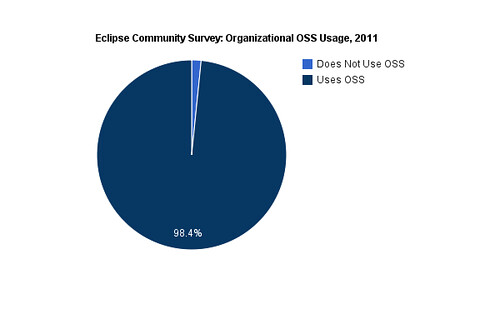
When users of an open source development tool are surveyed, it follows that most of their respective organizations will likewise use open source software in some capacity. What is less predictable is the degree to which these same organizations interact with open source projects.
Question 28 of the Eclipse survey categorized organizations as follows:
- Does not allow the use of any open source software
- Uses open source software, but does not interact with open source project communities in any way
- Uses open source software and contributes back (through bug reports, code, resources) to at least one open source project community to help improve the quality of the projects we consume
- Contributes significant development resources (contributors, committers and/or maintainers, project leaders) to at least one open source project community in order to help influence the evolution of the projects we consume
- Has a business model that relies on open source software for its success
Here’s a chart of the percentage of survey repondents per category.
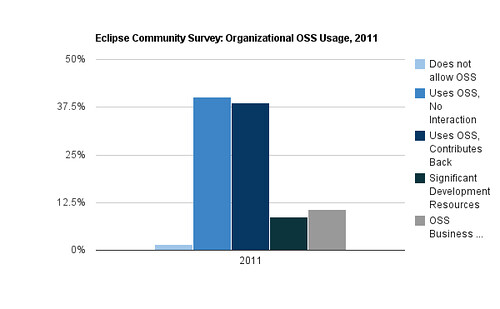
We see, as noted above, that the percentage of organizations that disallows open source is small. The data also indicates, however, that the largest single category is organizations that consume open source, but do not contribute back in any fashion.
Interestingly, however, the aggregate of categories that do contribute back to open source outweigh those that do not.
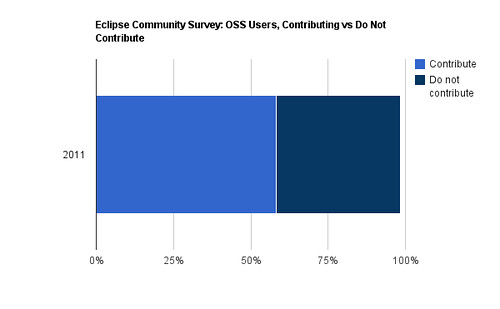
58.2% of organizations do give back to open source via one or more mechanisms against 40.1% that do not. More importantly, organizations are trending towards contributions. Here is the percentage in change between respondents to the 2011 survey and the 2007 iteration.
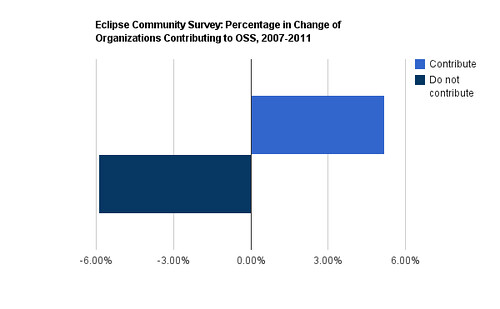
According to the Eclipse data, 5.2% more organizations are contributing back to open source is some form, while 5.9% fewer are strictly consuming open source software. Breaking out those results by category, we can identify specific patterns in growth.
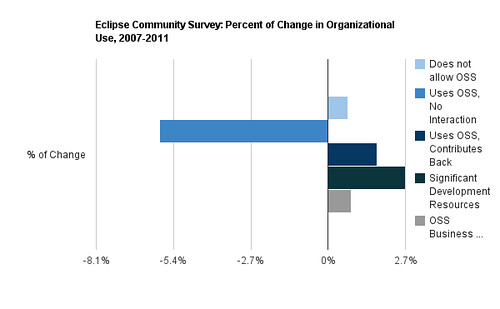
Pure consumers of open source have declined, while each category of open source user that contributes has exhibited growth over the four year period. As have, notably, the number of organizations that do not permit the usage of OSS, although that growth is modest.
Conclusions
We are not able to extrapolate from this survey because of its design, but as a window into current organizational attitudes towards open source amongst Eclipse users, it is interesting.
If the slight growth in the number of organizations prohibiting the usage of open source software is a concern, the trendline in the ratio of consuming versus contributing organizations is a welcome development. Contributing back to open source – whether in the form of actual code, developmental or financial resources or merely bug reports – does not require altruism. In general, it is in a given entity’s self-interest; bug reports may result in fixes, code contributed back obviates the need to maintain an internal fork, and so on.
That the data from the Eclipse survey that indicates that the awareness of same is growing, then, is a welcome development.
Disclosure: The Eclipse foundation is a RedMonk client.
